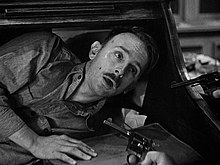|
John Qualen
John Qualen (born Johan Mandt Kvalen,[1] December 8, 1899 – September 12, 1987) was an American character actor of Norwegian heritage who specialized in Scandinavian roles. Early yearsQualen was born in Vancouver, British Columbia, the son of immigrants from Norway; his father was a Lutheran minister[2] Some sources give Oleson as the family's original name,[3] later Oleson Kvalen[4] as Qualen's earlier surnames. His father's ministering meant many moves and John was 20 when he graduated from Elgin (Illinois) High School in 1920. For four years, Qualen attended the University of Toronto, but he left there to join a Toronto-based traveling troupe as an actor.[2] CareerIn a Milwaukee Journal interview he said he needed to start working and did so with the Chautauqua Circuit.[citation needed] He drove stakes for the tent used for presentations until a night in Ripon, Wisconsin, when the scheduled principal lecturer did not arrive. Qualen replaced the missing man after he showed the Chautauqua manager a medal he had won for oratory as a high school student. Not long after that, he formed his own troupe, The Qualen Concert Company.[5] At the conclusion of a tour following his marriage, Qualen and his wife, Pearle, formed the company to produce plays. The group's stops in a two-year tour included Boston, Chicago, and New Orleans. The Qualens' income was low enough that he sold cookware in New York for additional funds. Using a handcart to move the merchandise, he made more money from sales than from his acting.[2]  Eventually reaching Broadway, he gained his big break there in 1929, when he was cast as the Swedish janitor Carl Olsen in Elmer Rice's play Street Scene. His movie career began when he re-created the role two years later in the film adaptation of the stage production. That screen performance was followed by his appearance in John Ford's Arrowsmith (1931), which began a more than 35-year membership in the director's "stock company", with supporting roles in The Searchers (1956), Two Rode Together (1961), The Man Who Shot Liberty Valance (1962) and Cheyenne Autumn (1964).  Appearing in well over one hundred films, and acting on television into the 1970s, Qualen performed many of his roles with various accents, usually Scandinavian, often intended for comic effect. Qualen assumed a Midwestern dialect as Muley, who recounts the destruction of his farm by the bank in Ford's The Grapes of Wrath (1940), in a performance so powerful it reportedly reduced director Ford to tears; and as the confused killer Earl Williams in Howard Hawks' classic comedy His Girl Friday (1940). As Berger, the jewelry-selling Norwegian resistance member in Michael Curtiz' Casablanca (1942), he used a light Scandinavian accent, but put on a thicker Mediterranean accent as the homeward-bound fisherman Locota in William Wellman's The High and the Mighty (1954) Qualen was also a flautist, having begun to play at age eight. He continued his musical education while at the University of Toronto and went on to play with some professional orchestras, including the Hollywood Bowl Orchestra.[2] Qualen was treasurer of The Authors Club and historian of The Masquers, Hollywood's social group for actors. Personal life and deathIn 1924, after he became an actor, Qualen married Pearle Larson, whom he had known in high school. She joined him in the Toronto-based traveling troupe when he left university, becoming the troupe's costume mistress.[2] The couple remained together for over 60 years, until 1987, when Qualen died at age 87 of heart failure in Torrance, California.[6] The couple had three children, one of whom named Kathy, is an actress.[7] Filmography1930s
1940s
1950s
1960s
1970s
Television
References
Further reading
External linksWikimedia Commons has media related to John Qualen.
|
||||||||||||||||||||||
